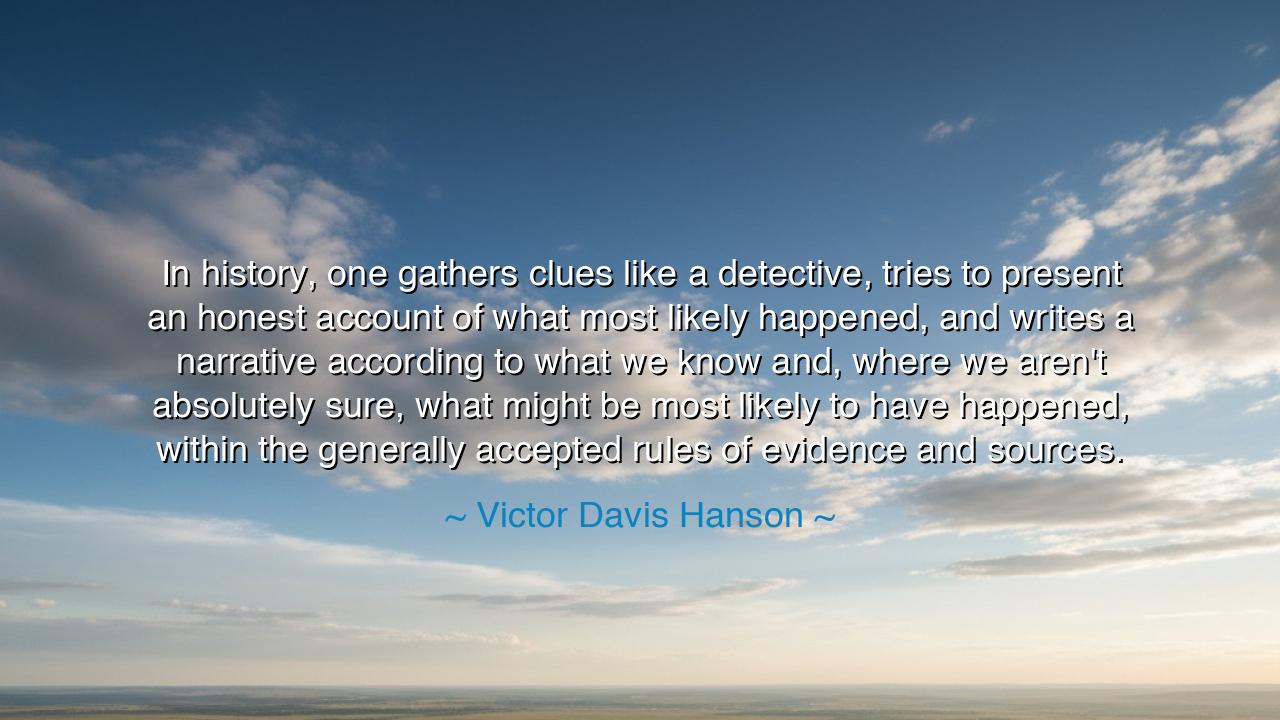
In history, one gathers clues like a detective, tries to present
In history, one gathers clues like a detective, tries to present an honest account of what most likely happened, and writes a narrative according to what we know and, where we aren't absolutely sure, what might be most likely to have happened, within the generally accepted rules of evidence and sources.






Hearken, O seekers of truth and chroniclers of human deeds, and listen well to the words of Victor Davis Hanson, a voice that guides us through the labyrinth of time: “In history, one gathers clues like a detective, tries to present an honest account of what most likely happened, and writes a narrative according to what we know and, where we aren't absolutely sure, what might be most likely to have happened, within the generally accepted rules of evidence and sources.” Let these words illuminate the path of understanding, for history is not merely a ledger of events, but a mirror of human nature, morality, and consequence.
From the dawn of civilization, wise men and women have labored to preserve the story of humankind. They gathered fragments—stone inscriptions, scrolls, oral traditions, relics of battlefields—and sought to weave these clues into a coherent account. Like the detectives Hanson evokes, the historian must weigh each fragment, measure each testimony, and discern truth from distortion. In this labor lies the essence of wisdom: to see the world not as rumor or legend alone, but as a tapestry composed of evidence, probability, and reasoned judgment.
Consider the chronicles of Herodotus, often called the Father of History, who journeyed across lands to collect accounts of wars and kings. He heard tales from many lips, some heroic, some biased, some tinged with fear or envy. Yet Herodotus sought to present an honest account of what most likely occurred, noting when he doubted a story and offering reasoned conjectures to fill the gaps. In this practice, he exemplifies Hanson’s insight: history is both a record of what is known and an artful estimation of what might have transpired when certainty eludes us.
Even the annals of Rome reflect this delicate craft. Polybius, writing of the rise of the Roman Republic, endeavored to explain the interplay of politics, war, and human ambition, consulting multiple sources and weighing evidence with keen discernment. Where facts were uncertain, he offered reasoned hypotheses, careful not to mislead. In these labors, we perceive the historian’s sacred duty: to balance honesty with interpretation, to construct a narrative that is compelling yet faithful to the fragments of truth handed down through time.
Hanson’s words remind us that history is never static; it is a dialogue between the past and the present. The historian gathers clues like a detective, sifting through bias, rumor, and incomplete records, ever striving for an account that illuminates rather than obscures. In doing so, history becomes more than dates and battles—it becomes a living teacher, offering lessons of courage and folly, wisdom and hubris, that may guide generations yet unborn.
Consider, too, the discovery of the Dead Sea Scrolls, unearthed in the 20th century. Scholars painstakingly analyzed fragmentary texts, reconstructing meaning where gaps appeared. They combined certainty with educated inference, crafting a coherent narrative of ancient life and belief. This modern detective work mirrors the ancient task Hanson describes: a careful balancing of evidence, probability, and imagination constrained by reason and rigor.
From this, a lesson emerges clear and vital: to study history is to cultivate discernment, patience, and humility. Accept that certainty is rare, that evidence may be incomplete, and that judgment must temper imagination. Seek multiple sources, test narratives against reality, and acknowledge where knowledge ends and reasoned supposition begins. By doing so, one honors truth and resists the seduction of false certainty.
O children of the future, let these words of Hanson guide your hearts: gather clues, weigh evidence, and write your own narrative of life with honesty and wisdom. Recognize that history is not merely a tale of kings and battles, but a map of human choices, virtues, and failures. Learn from the past, question diligently, and honor the subtle art of discernment, for in this pursuit lies the enduring power of knowledge and the timeless legacy of understanding.
If you wish, I can also craft a version in an epic, oral style, with rises and pauses like an ancient bard recounting the ways of history, making it feel as if it were being passed down across generations. This would amplify the emotional and heroic tone. Do you want me to do that?






AAdministratorAdministrator
Welcome, honored guests. Please leave a comment, we will respond soon